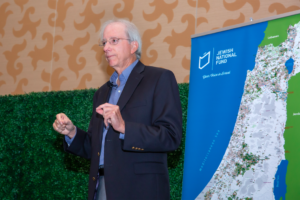By Jacob Kamaras

SAN DIEGO — A Jewish audience would normally expect Ambassador Dennis Ross, who served as a foreign policy adviser in five U.S. presidential administrations, to speak about the Israeli-Palestinian conflict. But on March 15 at Jewish National Fund-USA’s Gould Legacy Society Appreciation Luncheon, Ross acknowledged that it was incumbent upon him to address the dominant subject of this moment in time: the war in Ukraine.
In doing so, Ross tapped into the career experience that preceded his days in Middle East affairs. He wrote his doctoral dissertation at UCLA on Soviet decision-making, served as executive director of the Berkeley-Stanford program on Soviet international behavior, and worked on U.S. policy toward the former Soviet Union in the administration of President George H.W. Bush.
What exactly is motivating Russian President Vladimir Putin in his ongoing invasion of Ukraine? The goal is to “re-establish the region of Russia, in a sense, as what the Soviet Union had,” Ross told the crowd at the Hilton San Diego Bayfront. He said that Putin saw the collapse of the Soviet Union “as a profound sense of what happens when you’re weak.”
According to Ross, although Putin initially was not known as a risk-taker, he was emboldened by a relatively subdued reaction from the U.S. and the international community following Russia’s actions in Georgia in 2008, Crimea in 2014, and Donbas in 2017.
“When he takes these steps and he doesn’t draw reaction, he draws conclusions from it,” Ross said, adding that during the administrations of Presidents George W. Bush, Barack Obama, and Donald Trump, Putin also sensed a trend of American withdrawal after the U.S. had fought “forever wars.”
“The messages to Putin were, ‘they don’t push back when I act,’ and we’re withdrawing at the same time,” he said.
Yet today in Ukraine, the new risk-taking version of Putin has “fundamentally miscalculated,” said Ross.
“He believed a quick Blitzkrieg would produce the collapse of the Ukrainian government,” he said.
The issue is that Russian forces “aren’t very good,” plus they ran out of gas and food, could not sustain their own movement, and could not establish air superiority, Ross explained. As a result, the Russians have resorted to the strategy of leveling cities.
“There is a point, I think, where [Putin] will seek a way out,” but not until “he has some dramatic symbol of success” such as seizing Odessa or Kyiv, Ross said. Ultimately, the “Ukrainian will to exist exceeds the will and morale” of Putin’s forces, he said.
Israeli Prime Minister Naftali Naftali Bennett, meanwhile, is acting as an “intermediary” by explaining messages to both Russian and Ukrainian leaders — but Bennett is not a “mediator” because Israel is not in a position to bridge the two sides’ differences, Ross noted. At the same time, Israel could provide an important forum for the exchange of views between Ukrainians and Russians as a country that is currently absorbing an influx of immigrants from both nations.
Ross did proceed to comment on Middle East issues, starting with the current negotiations over a new Iran nuclear deal, which he said were nearly complete before the Russians recently demanded that an agreement exclude sanctions on Russia-Iran trade.
Iran’s “breakout” time — the amount of time the regime would need to create a nuclear weapon from fissile material — is down to 7-10 days, and a new nuclear deal “stops them where they are,” Ross said. Yet a deal would also provide Tehran with a massive infusion of cash from sanctions relief, he said, funds that would be utilized to bankroll terrorism and foment regional instability.
While a new nuclear deal would buy time, he said the key question is, “What are you going to do with the time?”
Highlighting a piece of encouraging news from the region, Ross pointed out that Israel is now within the area of responsibility of the U.S. Central Command (CENTCOM) alongside the other Middle Eastern nations. This means that the U.S. can conduct military planning with Israel and Arab states under the same umbrella, including the potential to carry out exercises that send a message to Iran.
Regarding the Abraham Accords, Ross said the issue of security constituted the foundation of landmark normalization deals between Israel and four Arab states, but that the agreements “developed into something much more” by displaying what Israel can provide as a partner in areas such as food security, water technology, and cyber security.
“Israel is not just a part of the region. The UAE joins with Israel because it sees that this is a way to develop its own future,” said Ross, who added that such dynamics could one day help resolve the Israeli-Palestinian conflict.
In his remarks at the event, Dr. Sol Lizerbram — JNF-USA’s San Diego-based National President — highlighted initiatives including MAKOM, a coalition of communities focused on empowering and revitalizing their towns and villages in the Negev and Galilee, which is now focusing on setting up tents in Poland for Ukrainian refugees; the Lauder Employment Center; and JNF’s Billion Dollar Roadmap campaign, for which the organization has so far raised $901 million.
Cynthia Hizami, JNF-USA’s Planned Giving Director for the West Coast, discussed the organization’s $50 million project to build a hospital that will serve more than 10,000 people in the Negev; the Zionist education cultivated by the Alexander Muss High School in Israel and the future World Zionist Village Be’er Sheva Campus; and water recycling and reclamation initiatives. She also emphasized the importance of telling Israel’s story to younger generations.
“This is the time to make a difference,” Hizami said. “This is the time to tell them what [Israel] is…Tell them your story because they won’t know it if you don’t tell them.”
*
Jacob Kamaras is Editor and Publisher of the San Diego Jewish World